Rishi Sunak has chosen to go for a summer election. The Prime Minister has confirmed in an address to the nation this evening that the 2024 general election will be held on July 4. A new parliament will be summoned on 9 July and the state opening will be on 17 July.
His announcement comes after speculation since this morning that Sunak was planning to roll the dice and go to the polls in the summer rather than wait for the autumn. Notably, No. 10 chose not to dampen down the speculation – and when asked at lunchtime Sunak repeated his old line that the election would be held in the second half of the year, which included July.
His message was somewhat diluted by the fact it was pouring with rain by the end of the address and music played from the outside street
In his speech, Sunak began by saying the last five years were the toughest since the second world war for the UK. He mentioned the pandemic – including the support he offered as Chancellor – as well as the war in Ukraine as reasons for this. Sunak then pivoted to the economy – ‘the bedrock of any future success’:
‘I came to office above all, to restore economic stability. Economic stability is the bedrock of any future success. Whether that is rising wages and good jobs, investment in our public services, or the defence of the country.
And because of our collective sacrifice and your hard work, we have reached two major milestones in delivering that stability, showing that when we work together anything is possible. You must choose in this election who has that plan.’
Sunak said voters must make a choice on who is best placed to lead the UK in its recovery. He accused Starmer several times of being untrustworthy and lacking a plan. However, his message was somewhat diluted by the fact it was pouring with rain by the end of the address and ‘Things Can Only Get Better’ was playing from outside the street.
Is a summer election a wise decision? Despite repeated reports of rumours of a summer election, it is fair to say this is a decision that has taken most of the cabinet and parliamentary party by surprise – and for many it is a nasty surprise. As one former minister put it to Coffee House: ‘He is opting for an election because he has run out of road’. Calling an election when your party is 20 points behind in the polls and you don’t actually have to is certainly bold, and perhaps brave. Some Tory MPs were in disbelief over the idea Sunak would do so even minutes before the speech. One asked why the government has decided to steer towards this iceberg. The risk is that it looks as though Sunak is giving up – rather than fighting on.
So, why has Sunak done this? As I understand it, there were several factors behind the decision not to wait until the autumn – which has long been the preferred date among Tory election strategists. First, there was a fear that there would not be much economic improvement by the autumn with scepticism over the likelihood of rate cuts or the ability of the government to deliver tax cuts. So by instead calling for an election on the day of encouraging inflation figures, they can make the argument that the economy is turning a corner.
Next, they hope that in the window until polling day, a flight will take off to Rwanda with asylum seekers on it. What's more, some around Sunak hope that by going quickly there is some hope they avoid a Nigel Farage comeback – however, the Reform party have notably announced a 'massive rally' for Thursday. There were also questions about how long the Tory party would hold together – given the regular infighting. Finally, Labour could be caught by surprise – members of the shadow cabinet were this morning perplexed but ultimately they are more than happy the election is coming early.
In terms of the Tory prospects in this election, many in the party see it as reducing losses rather than a race in which they have a fighting chance. No sitting prime minister has ever come back from Sunak's current poll deficit to win – even if the 2017 general election showed how a double digit lead could be blown. However, there are those in CCHQ who believe the race will tighten and Starmer has his own problems – such as with the Muslim vote. Figures in Conservative Campaign Headquarters insist the race is closer than the pollsters suggest. In six weeks' time we will find out which side is right.
Catch up on the latest Coffee House Shots with Katy Balls and James Heale:







Comments
Join the debate for just £1 a month
Be part of the conversation with other Spectator readers by getting your first three months for £3.
UNLOCK ACCESS Just £1 a monthAlready a subscriber? Log in